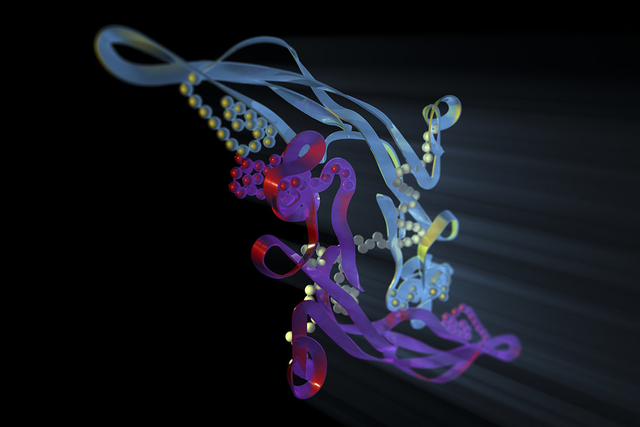
The immunotherapy drugs called checkpoint inhibitors have transformed treatment for some people with cancer. Currently, a major focus in cancer research is looking for ways to make these drugs effective for a greater number of people and more types of cancer.
One of the many approaches that scientists are now studying is combining immunotherapies with drugs that block the actions of a molecule called transforming growth factor-beta (TGF-ß). The importance of TGF-ß was uncovered more than 30 years ago by Sloan Kettering Institute Director Joan Massagué.
“There has been tremendous interest in this new avenue of treatment,” Dr. Massagué says. “Right now, we have a serious opportunity to leverage the robust knowledge that we’ve built about TGF-ß and use it to make immunotherapy more effective. TGF-ß is actually a hormone that is released by cells. This means it is quite accessible to drugs that can block its activity.”
A Fundamental Molecule with Many Roles
TGF-ß is critical for regulating how cells function. It works by sending signals from a cell’s membrane to its nucleus, telling it which genes to make into proteins. Among the most important jobs of TGF-ß are directing embryonic development and regulating the immune system. It also plays a role in whether cancer spreads.
It is the effect of TGF-ß on the immune system that many researchers are now most interested in studying.
A study published in February 2018 in Nature reported that, in people being treated with the immunotherapy drug atezolizumab (Tecentriq®), levels of TGF-ß in tumors correlated with how well people responded. In short, the more TGF-ß that tumors had, the less likely it was that atezolizumab worked. This is because TGF-ß can prevent the immune cells called T cells from infiltrating and attacking tumors. Checkpoint inhibitors boost the activity of T cells, but if the immune cells can’t get into the tumor, they will not be effective.
Another study in the same issue of Nature reported that combining a TGF-ß-blocker called galunisertib with immunotherapy allowed the immune system in mouse models of colon cancer to attack tumors that it had previously not been able to go after.
“This research showed that TGF-ß prevents the incoming T cells from penetrating and infiltrating the tumor,” Dr. Massagué says. “If you block TGF-ß, however, T cells infiltrate and kill the tumor cells.”
Combining Approaches in the Clinic for Many Cancer Types
Several clinical trials now under way are looking at how to combine immunotherapy with drugs that block TGF-ß. MSK medical oncologist Anna Varghese is the co-principal investigator of one such trial for pancreatic cancer.
“Immunotherapy alone is not effective against pancreatic cancer for most patients,” Dr. Varghese explains. “This is because pancreatic tumors have an immunosuppressive microenvironment.” That means the cells and tissue around the tumor prevent immune cells from getting in and attacking the cancer.
Dr. Varghese’s trial combines the immunotherapy drug durvalumab (Imfinzi®) with galunisertib. The study is still ongoing, and it’s too early to know how effective the combination will be or what side effects it will have, but Dr. Varghese hopes to report preliminary findings soon.
Research on TGF-ß blockers goes beyond immunotherapy to look at their effectiveness when combined with other kinds of drugs. Recently, MSK medical oncologist James Harding was an investigator in a trial that looked at galunisertib, either alone or in combination with other drugs, for the treatment of liver cancer.
Early analysis of the study showed that when galunisertib was combined with the targeted therapy sorafenib (Nexavar®), people had more favorable outcomes compared with other treatments. However, Dr. Harding comments that “the design of this early study makes it difficult to say how impactful this combination strategy will ultimately be for liver cancer.
“Furthermore,” he adds, “with the advent of effective immunotherapy, the focus of the investigation has shifted to pairing galunisertib and other TGF-ß blockers with immune checkpoint inhibitors.”
Clinical trials focusing on TGF-ß blockers are ongoing at other cancer centers as well as at MSK.
Taking a New Look at a Familiar Target
“For a long time, drug companies have been interested in harnessing the power of TGF-ß blockers, not only for cancer but for other diseases as well,” Dr. Massagué says. “Until now, there’s been concern about doing that because we know that TGF-ß has so many different functions in cells.” Long-term use of these drugs, he explains, would have too many harmful side effects.
“However, combining a TGF-ß blocker with checkpoint immunotherapy and using it as temporary way to boost the effectiveness of these other drugs may be possible,” he concludes.
Editor’s note: On April 16, 2019, Dr. Massague was co-author of a review article in Immunity that discussed how knowledge of TGF-β signaling in immune cells is being leveraged to unleash the immune system against tumors.








